
JOURNAL OF ALLERGY AND CLINICAL IMMUNOLOGY
Scope & Guideline
Connecting researchers to the latest in immunological advancements.
Introduction
Aims and Scopes
- Allergy Mechanisms and Pathophysiology:
Investigates the biological mechanisms underlying allergic reactions, including the role of immune cells, cytokines, and genetic factors in the development and exacerbation of allergic diseases. - Clinical Management and Treatment Strategies:
Focuses on the efficacy and safety of various treatment modalities including biologics, immunotherapy, and pharmacological interventions for managing allergic conditions and asthma. - Epidemiological Studies and Public Health:
Examines the prevalence, risk factors, and health disparities associated with allergic diseases and asthma across different populations, providing insights for public health interventions. - Innovative Diagnostic Approaches:
Explores novel diagnostic tools and methodologies, including biomarker identification, imaging techniques, and advanced data analytics to improve the diagnosis and management of allergies and related conditions. - Patient-Centered Research and Quality of Life:
Emphasizes the importance of understanding patient experiences, treatment adherence, and quality of life in individuals with allergic and immunologic disorders.
Trending and Emerging
- Biologics and Targeted Therapies:
The increasing use and investigation of biologics, such as dupilumab and mepolizumab, indicate a trend towards targeted therapies that specifically inhibit pathways involved in type 2 inflammation and other immune dysregulations. - Telemedicine and Digital Health Innovations:
The COVID-19 pandemic has accelerated the adoption of telemedicine and digital health solutions for allergy management, enhancing patient accessibility and engagement in their care. - Precision Medicine in Allergy and Immunology:
There is a growing focus on precision medicine approaches that utilize genetic, epigenetic, and biomarker data to tailor treatments for individual patients, particularly in complex conditions like asthma and food allergies. - Gut Microbiome and Allergic Diseases:
Emerging research highlights the role of the gut microbiome in the development and management of allergic diseases, suggesting that microbiome modulation could be a novel therapeutic strategy. - Environmental and Socioeconomic Influences:
Research is increasingly addressing the impact of environmental factors and socioeconomic status on allergic disease prevalence and outcomes, emphasizing the need for community-level interventions.
Declining or Waning
- Traditional Allergy Testing Methods:
Research focused on conventional skin prick tests and serum IgE testing has seen a decline as newer, more sophisticated diagnostic techniques gain prominence, such as component-resolved diagnostics and machine learning approaches. - Generalized Approaches to Food Allergy:
The focus on broad, non-specific food allergy management strategies is decreasing in favor of personalized approaches that consider genetic, immunologic, and environmental factors influencing individual responses. - Static Immunotherapy Protocols:
There has been a waning interest in rigid, one-size-fits-all immunotherapy protocols, with a shift towards more flexible, patient-tailored regimens that adapt to individual patient needs and responses. - Epidemiological Research on Established Allergens:
While foundational studies on common allergens like pollen and dust mites remain important, there is a noticeable decrease in publications focused on these established allergens in favor of research on emerging allergens and their unique properties. - Non-specific Asthma Treatments:
The interest in generic asthma management strategies has declined as the field moves towards targeted therapies that address specific biological pathways and endotypes.
Similar Journals
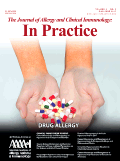
Journal of Allergy and Clinical Immunology-In Practice
Empowering practitioners with cutting-edge insights.The Journal of Allergy and Clinical Immunology-In Practice, published by ELSEVIER, stands as a leading platform in the field of allergy and immunology, specifically tailored for practitioners and researchers. With an impressive 2023 Q1 ranking in both the Immunology and Allergy categories, this journal demonstrates a significant impact within the academic community, evidenced by its Scopus rank #41 out of 233 and an impressive percentile rank of 82. The journal focuses on providing advanced studies, clinical findings, and innovative treatment methodologies that address current challenges in allergy and immunology, making it a vital resource for professionals in these fields. With a comprehensive coverage of relevant topics from 2013 to 2024, the journal continues to evolve alongside emerging trends and developments in clinical practice, fostering an environment conducive to scholarly research and application. Although it currently does not offer open access, authors and readers can access a wealth of information and contribute to ongoing dialogues through its robust publication platform.
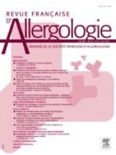
Revue Francaise d Allergologie
Exploring the Frontiers of Allergy ScienceThe Revue Francaise d'Allergologie, an esteemed publication in the field of Immunology and Allergy, is published by ELSEVIER MASSON, CORP OFF in France. This journal plays a pivotal role in disseminating significant findings and advancements in allergy research and immunotherapy, reflecting the latest trends and challenges in these rapidly evolving areas. As part of its commitment to scholarly rigor, the journal encompasses a wide range of topics pertinent to allergology, aiming to bridge the gap between clinical practice and academic research. Although currently not listed as open access, it provides critical insights essential for researchers, professionals, and students alike, ensuring the advancement of knowledge and therapeutic strategies in allergy and immunology. With its impact factor and positioning in the Q4 category, it serves as a valuable resource, aiding in the education and development of future leaders in the field. The Revue Francaise d'Allergologie continues to be a vital platform for the exchange of innovative ideas and findings from 2009 to the present.

EUROPEAN JOURNAL OF IMMUNOLOGY
Exploring New Frontiers in Immune ResearchWelcome to the European Journal of Immunology, a premier peer-reviewed journal dedicated to advancing the field of immunology and allergy research. Established in 1971 and published by Wiley, this esteemed journal has been consistently ranked in the top quartile (Q1) across its categories, highlighting its significant impact within the scientific community. With an impressive Scopus ranking, the journal occupies the 64th position in Immunology and Allergy and the 74th in the broader sector of Immunology and Microbiology, demonstrating its vital role in driving innovation and knowledge in immunological studies. The European Journal of Immunology publishes high-quality original research, comprehensive reviews, and insightful commentary, making it an indispensable resource for researchers, healthcare professionals, and students dedicated to understanding the complexities of the immune system. Although not an open-access journal, it offers various subscription options to ensure that institutions and individuals can access pivotal research that shapes the future of immunology.
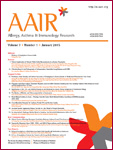
Allergy Asthma & Immunology Research
Advancing knowledge in Allergy, Asthma, and Immunology.Allergy Asthma & Immunology Research, published by the Korean Academy of Asthma Allergy & Clinical Immunology, is a leading journal dedicated to advancing the fields of immunology, allergy, and respiratory medicine. With an ISSN of 2092-7355 and an E-ISSN of 2092-7363, this esteemed publication has been a cornerstone for researchers and practitioners since its inception in 2009 and continues to disseminate critical findings through till 2024. The journal is ranked in the Q3 category in Immunology and the Q2 category in Immunology and Allergy as well as Pulmonary and Respiratory Medicine, illustrating its impact in these vital fields. With a solid Scopus ranking in multiple sub-disciplines, the journal not only contributes to the scientific discourse but also promotes innovative research and clinical practices. Although currently operating without an open access model, the journal remains highly regarded for its thorough peer-review process and commitment to academic excellence, making it an essential resource for professionals, researchers, and students passionate about advancing knowledge in allergy, asthma, and immunology.
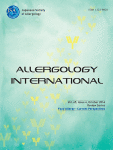
ALLERGOLOGY INTERNATIONAL
Innovating solutions in allergy management.ALLERGOLOGY INTERNATIONAL is a prestigious, peer-reviewed journal dedicated to advancing the field of immunology and allergy research. Published by the Japanese Society of Allergology, this Open Access journal has been democratizing knowledge since 1996, providing a platform for the latest findings and clinical practices in the management of allergic diseases. Its impressive Q1 ranking in both Immunology and Allergy** and **Medicine (miscellaneous)** categories in 2023 highlights its significance in the global scientific community, with a commendable Scopus ranking of #31 out of 233 in the field of immunology. The journal's focus on innovative research, comprehensive reviews, and case studies ensures that it remains a vital resource for researchers, healthcare professionals, and students alike. Situated in Tokyo, Japan, it continues to bridge gaps in allergy-related health information and foster international collaboration among scholars.

Asia Pacific Allergy
Innovative Research for a Healthier TomorrowAsia Pacific Allergy, published by Lippincott Williams & Wilkins, is a prominent academic journal dedicated to advancing research and clinical practice in the fields of dermatology, immunology, and allergy. With its ISSN 2233-8276 and E-ISSN 2233-8268, the journal provides a platform for innovative studies and reviews that cater to an international audience of researchers, healthcare professionals, and students involved in allergy and related disorders. Although it does not currently offer open access to its publications, the journal's robust output from 2015 to 2017 and its ongoing contribution to the literature from 2021 to 2024 showcase the evolving landscape of allergy research in the Asia Pacific region. Recognized in the 2023 Journal Citation Reports, it holds a Q2 ranking in Dermatology and a Q3 ranking in Immunology and Allergy, while its Scopus ranks further emphasize its significance within these domains, positioning it among the top journals in the field. As a source of cutting-edge research, Asia Pacific Allergy plays a vital role in fostering collaboration and knowledge dissemination, ultimately assisting in the betterment of patient care and treatment strategies across the region.

Allergo Journal
Unveiling the complexities of immune disorders.Welcome to the Allergo Journal, a pivotal publication in the field of Immunology and Allergy, housed under the esteemed SPRINGER HEIDELBERG publishing house. With an ISSN of 0941-8849 and E-ISSN 2195-6405, the journal has been serving the scientific community since its inception in 1994. Although its Scopus coverage was discontinued in 2017, the journal remains significant, ranked #135 out of 186 in its category and positioned in the 27th percentile, reflecting its contributions to vital research in allergy and immunological disorders. While the journal is not an open access publication, it continues to provide a platform for rigorous academic discourse and advances in the study of allergens and immune response. The Allergo Journal stands as a crucial resource for researchers, professionals, and students dedicated to deepening their understanding of allergies and immunology, fostering advancements in therapy and comprehensive patient care.

Allergy Asthma and Clinical Immunology
Empowering global collaboration in immunology.Allergy Asthma and Clinical Immunology, a pioneering open access journal published by BMC, has been at the forefront of immunological research since its inception in 2005. With an ISSN of 1710-1492, this UK-based journal has established a significant presence in the fields of Immunology, Allergy, and Pulmonary and Respiratory Medicine, achieving notable quartile rankings such as Q2 in Immunology and Allergy in 2023. It plays a crucial role in disseminating high-quality research that advances our understanding of allergy and asthma, making substantial contributions to clinical practices and public health. The journal embraces the principles of Open Access, allowing researchers, professionals, and students from around the globe to access its content freely, thus facilitating knowledge sharing and collaboration within the scientific community. As it converges towards 2024, Allergy Asthma and Clinical Immunology continues to attract impactful studies that drive innovation and improve patient care in the face of rapidly evolving challenges in immunological health.
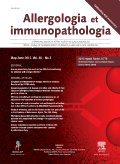
ALLERGOLOGIA ET IMMUNOPATHOLOGIA
Fostering Collaboration in Allergy and Immunology ResearchALLERGOLOGIA ET IMMUNOPATHOLOGIA is a distinguished academic journal dedicated to the field of immunology and allergy, published by CODON PUBLICATIONS, based in Singapore. With its ISSN 0301-0546 and E-ISSN 1578-1267, this journal aims to provide an open platform for researchers and practitioners to share their findings, emphasizing topics related to immunopathology and respiratory health. Covering a broad scope from 1973 to 2024, it currently holds a notable position in several category quartiles, including Q3 in Immunology and Allergy, and Q3 in Pulmonary and Respiratory Medicine as of 2023. Despite the absence of an open access option, the journal maintains an essential role in disseminating pivotal research, reflected in its Scopus rankings that position it within the core of its discipline. With an impact factor acknowledging the significance of its contributions, ALLERGOLOGIA ET IMMUNOPATHOLOGIA continues to be a vital resource for ongoing education and advancement in immunological and allergic research.
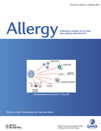
ALLERGY
Pioneering Research in Allergy and Immunological Health.ALLERGY is a leading international journal published by WILEY, dedicated to advancing the understanding of allergic diseases and immunology. With an ISSN of 0105-4538 and an E-ISSN of 1398-9995, this esteemed journal has been at the forefront of the field since its inception in 1948 and continues to publish high-quality research up until 2024. Positioned in the Q1 category for both Immunology and Allergy, ALLERGY ranks impressively within the top percentiles of its categories, underscoring its significant impact, as reflected in its Scopus rankings (#11 out of 233 in Immunology and Allergy, and #14 out of 236 in Immunology and Microbiology). Researchers and practitioners accessing this journal can expect a rigorous selection of peer-reviewed articles that address current challenges, innovative therapies, and advancements in the immunological sciences. Although it is not an open-access journal, ALLERGY remains vital for academics, healthcare professionals, and students alike, fostering a deeper understanding of the mechanisms and treatments associated with allergies.